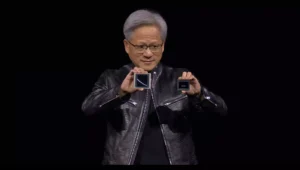Nvidia Invests $1 Billion in Nokia to Bring AI to Telecom Networks

Nokia’s Comeback Fueled by AI
Nvidia is investing $1 billion in Nokia, acquiring a 2.9% stake in the Finnish telecoms giant as part of a broad alliance to integrate artificial intelligence into the world’s wireless infrastructure. The deal positions Nvidia as one of Nokia’s largest shareholders and signals growing momentum behind the AI-driven telecom revolution.The two companies announced plans to collaborate on AI-enabled telecom networks and data center infrastructure, combining Nvidia’s cutting-edge chip technology with Nokia’s expertise in 5G and 6G networks. Nokia will issue 166,389,351 new shares to Nvidia in exchange for the investment.
Shares in Nokia surged 21% to a 10-year high following the announcement, adding €6.7 billion to its market capitalization. The investment represents a strong endorsement of Nokia’s shift away from traditional network infrastructure toward AI and cloud-based growth opportunities.
“This partnership will accelerate our vision of intelligent networks that learn, optimize, and evolve in real time,” a Nokia executive said in a statement. The collaboration aims to make next-generation wireless systems faster, more efficient, and capable of autonomously managing energy consumption and data traffic.
The Rise of AI-RAN Technology
Nokia will deploy Nvidia’s Blackwell GPU-based computing platform to power its new AI-RAN (Artificial Intelligence Radio Access Network) initiative. This emerging technology allows telecom networks to use machine learning to allocate spectrum dynamically and manage massive amounts of user data efficiently.
According to research firm Omdia, the global AI-RAN market could reach $200 billion by 2030 as telecom providers race to modernize their infrastructure with AI-driven tools. Nvidia’s involvement gives Nokia an edge in this fast-growing segment.
Strategic and Geopolitical Implications
Nvidia CEO Jensen Huang emphasized that the partnership will strengthen U.S. influence in next-generation telecom technology. “Wireless networks are the lifeblood of industry and national security,” Huang said. “They were designed in the U.S., but too much of the hardware is foreign. That has to stop.”
The collaboration aligns with U.S. efforts to secure domestic supply chains for critical technologies and reduce dependence on Chinese hardware providers such as Huawei and ZTE.
Nvidia’s Expanding AI Empire
The Nokia investment is the latest in a string of strategic moves by Nvidia to deepen its reach beyond chips and into the global AI infrastructure ecosystem. Earlier this year, Nvidia announced plans to invest $100 billion in OpenAI to build advanced AI data centers, followed by a $5 billion investment in Intel to support U.S. chip manufacturing.
The company also recently committed £500 million to UK-based Nscale and participated in a funding round for AI infrastructure provider Crusoe, now valued at over $10 billion. Each deal reflects Nvidia’s long-term strategy to anchor itself at every level of the AI supply chain—from chips and data centers to telecom networks.
Nokia’s Reinvention Continues
For Nokia, the Nvidia deal underscores its latest reinvention after a decade-long struggle to regain prominence. Once a leader in mobile phones, the company was overtaken by Apple and Samsung in the 2010s and later pivoted to network infrastructure and 5G technologies.
Now, by embedding artificial intelligence across its network products and partnering with the world’s leading chipmaker, Nokia is signaling its intent to play a central role in the AI-powered telecom era.
